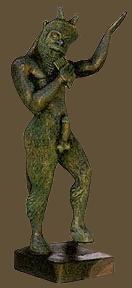
High on the northern slope of Ben Bison Brugh, a spring wells up from a sheltered grotto, and pours its water out upon the mountainside in a mossy-banked stream. The cave itself is shallow, and a rough niche is hewn into its back surface. Within the alcove is a sculpture of the old god Pan, pipes half-lifted to his enigmatic smile. The spring flows down the stone into a shallow pool just below, and a horn cup waits on a rock ledge to receive libations. To one side, a blocky pedestal of roughly carved stone, its top surface blackened by a perpetual flame and wreathed with a ring of fresh pine boughs, invites offerings to the goat-foot god.
This sacred spot is said to favor Arts of prophecy, and difficulty for all Omen cantrips cast here are reduced by one (two, for satyrs and moireae). It is after a sacrifice at this altar
that the satyrs of Buckthorn Tragos traditionally call for the calephetos, to determine whether it is time to lay aside their fae existence for this lifetime. With increasing frequency the answer has been yes, as the aging satyrs who so staunchly held their glade against sidhe conquest in the Accordance War succumb to the passing years. The peaceful
shrine has an air of lingering sadness now even on the brightest spring day. Those who would dishonor their memories by profaning the shrine incur the Goat God's wrath, and are cursed with panic whenever their courage is tried. This curse may even counteract the boon of House Fiona.
Daphnis, I that piped so rarely,
I that guarded well the fold,
'Tis my trembling hand that fails me;
I am weary, I am old.
Here my well-worn crook I offer
unto Pan the shepherd's friend;
Know ye, I am old and weary;
of my toil I make an end!
Yet I still can pipe it rarely,
still my voice is clear and strong;
Very tremulous in body,
nothing tremulous in song.
Only let no envious goatherd
tell the wolves upon the hill
That my ancient strength is wasted,
lest they do me grievous ill.
Macedonius: 6th century A.D.
The shrine is not supported by its own chat.
To play scenes set at the shrine, use the Dreaming Chat instead.
Muse, tell me about Pan, the dear son of Hermes, with
his goat's feet and two horns -- a lover of merry noise. Through
wooded glades he wanders with dancing nymphs who foot it on some
sheer cliff's edge, calling upon Pan, the shepherd-god, long-haired, unkempt. He has every snowy crest and the mountain peaks
and rocky crests for his domain; hither and thither he goes
through the close thickets, now lured by soft streams, and now he
presses on amongst towering crags and climbs up to the highest
peak that overlooks the flocks. Often he courses through the
glistening high mountains, and often on the shouldered hills he
speeds along slaying wild beasts, this keen-eyed god. Only at
evening, as he returns from the chase, he sounds his note,
playing sweet and low on his pipes of reed: not even she could
excel him in melody -- that bird who in flower-laden spring
pouring forth her lament utters honey-voiced song amid the
leaves....
- Homer, Hymn to Pan